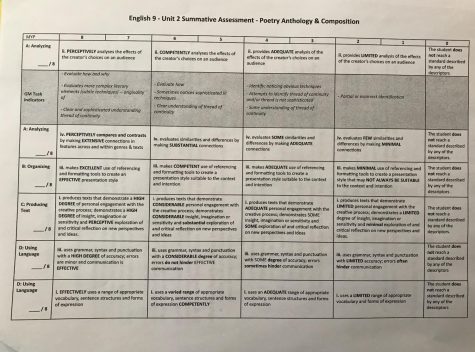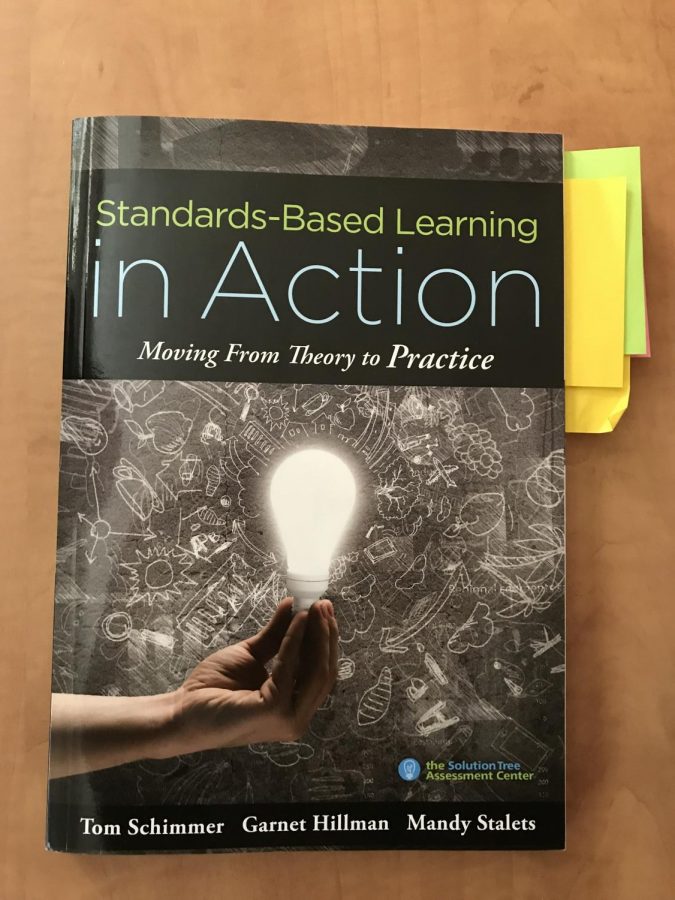English department shifts grading system to focus on student growth
A book Ms. Frisbie has been reading to better understand the Standard-based system and how to better implement it into her English classes. “There are so many benefits of this style of learning and teaching… it helps you plan with this kind of assessment in mind which then makes your teaching better,” said Ms. Frisbie. (Photo by Fernanda Molina.)
January 18, 2019
If you’re in Mr. Laub’s English classes, you celebrate when you get a 92 on an assignment. If you’re in Ms. Frisbie’s ninth-grade English classes, you celebrate when you get a six on an assignment.
This new grading system is called Standards-based grading (SBG), which was introduced to Mason ninth grade English classes in 2018. Instead of a regular 0-100 number scale, teachers are using a 1-7 number scale, similar to the IB or MYP system.
“The whole idea is just referencing student growth and achievements against standards, not just traditional letter grades,” said 9th Grade English teacher, Ms. Claire Frisbie.
Traditionally teachers focus on delivering knowledge, but with SBG they can also measure student learning and understand the effectiveness of their instruction. Instead of a single overall grade, SBG breaks down the subject matter into smaller learning targets. This way, teachers can track student progress, give appropriate feedback, and adapt instruction to meet student needs.

Currently, final grades are reflective of mastery at the end of a course and early mistakes can have a big impact on a students grade. However, in SGB there’s little penalty for early mistakes. No event can “ruin” a student’s grade. This creates an emotionally safe environment where students are encouraged to stretch themselves, make mistakes, and learn. The ability to reach mastery is celebrated versus the focus on the number of mistakes made along the way.
On the other hand, gifted and talented students can be truly challenged in a standards-based classroom because if they show early mastery of fundamental skills and concepts, they can then concentrate on more challenging work as they progress through the course.
Ms. Frisbie has been using this grading system in her 9th grade English classes for most assignments and believes it allows her and students to see their growth throughout the year. Additionally, she believes it allows students to receive better feedback instead of simply giving scores like 9/10 or 85%.
“It’s more accurate. When we’re really focused on the standards, were not averaging. We’re inspiring a love of learning and not a focus on grades,” said Ms. Frisbie.
Although losing the framework that is currently set, students tend to prefer this system more than the typical grading process.
“It’s a lot easier. We have one project a quarter and there’s no homework,” said freshman Annie Moore.
However, Standards-based grading has not been officially used this semester and teachers have had to convert when inputting grades into PowerSchool. Currently the goal of many English teachers is to weave in the mindset of standards-based grading, learning, and planning.
“It’s both exciting and challenging in its own way,” said Ms. Frisbie. “Hopefully by next year, it can be adopted grade wide.”










